

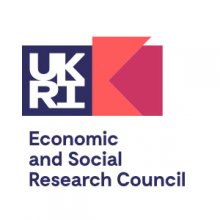
Festival of Social Science 2020
From 7 to 15 November 2020, we took part in the ESRC Festival of Social Science (FOSS) and hosted free events on subject matters such as how the hospitality sector can adapt post-COVID-19, making sense of Brexit, and the best way for families to communicate effectively about young people’s digital lives.
Festival programme
The week-long programme of events offered a thought-provoking insight into some of the UK’s leading social science research and how it impacts our social, economic, and political lives.
Dr Amy Isham from the Centre for Understanding of Sustainable Prosperity, and Dr Helen Fitzhugh from PrOPEL Hub, led a workshop to explore what people from different walks of life think about the nature of the relationship between wellbeing and productivity.
Dr Susan Venn from the Centre for the Understanding of Sustainable Prosperity, has talked to residents, businesses, service providers, charities and local government about their experience of living in Woking and Hay on Wye.

Dr Marton Ribary from The School of Law presented an event that considered whether we can create a more robust, ethical, and transparent Artificial Intelligence (AI) that we can trust and understand?
Senior leaders from both politics and law at the University of Surrey and beyond, explored this question through a live panel debate, as part of the ESRC Festival of Social Science.
The discussion considered technological, ethical, and societal aspects of AI methods which are consistent with democratic political ideals.
Two specific policy making challenges were debated:
- Can AI produce genuine transformations within the policy cycle and what this means for local governments delivering public services?
- If we see an end to the prevention of human rights, does this justify influencing election results with the help of new technologies?
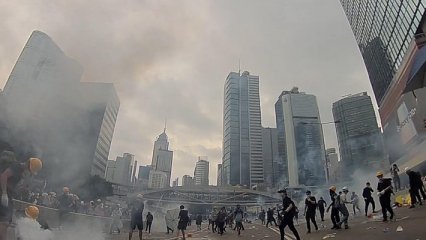
Dr Malte Kaeding from Department of Politics led a live panel debate, where extracts from his ESRC IAA funded documentary were shown.
This event launched the official trailer of “Black Bauhinia” (香港本色). This film crystallised one decade of Dr Kaeding’s research on social activism, identity politics and democratisation in Hong Kong, with his recent focus on the Hong Kong localist movement. After the trailer release, Dr Kaeding joined a panel with Ray Wong (one of the protesters whose story is featured in the documentary), Ben Rogers (CEO of Hong Kong Watch), and Natalie Bennett , Baroness Bennett of Manor Castle (co-chair of the All-Party Parliamentary Group on Hong Kong).
The panel discussed how to shape public debates through evidence-based advocacy and the creation of solidarity through empathy. Specifically, this drew on Malte’s participatory and editorial role in the making of Black Bauhinia, Ray’s personal journey in exile, Ben’s long-term professional advocacy work in Asia, and Baroness Bennett’s involvement in the Inter-Parliamentary Alliance on China.
The aim of this panel went beyond unpacking the complexity of Hong Kong’s situation to the public. More importantly, it evoked universal reflections about resistance against authoritarianism, the question of identity, the debate between structure and agency, and the meaning of homeland.
The production of ‘Black Bauhinia’ was funded by an ESRC-IAA grant and supported by the University of Surrey and Taiwan Foundation of Democracy.
Dr Yoo Ri Kim from Surrey’s School of Hospitality and Tourism Management considered the value and contributions of big data and digital innovation to the economic recovery of hospitality and tourism organisations post Covid.
With the COVID-19 pandemic, despite the different lockdown policies and restrictions within and across countries, there have been increasing demands for leisure activities, from domestic travel to eating out in your local restaurant. With the hospitality, tourism and retail sectors hit significantly from the pandemic, the recovery from COVID-19 is key for the survival and sustainability of the sectors.
Hack Hospitality was a series of events hosted by the School of Hospitality and Tourism Management at the University of Surrey, focussing on key research themes from digital technology to COVID-19 related research. Following on from the previous Hack Hospitality at Home: Hospitality, Tech, & COVID-19, this Festival of Social Science event focused on the hospitality, tourism and retail sectors, drawing on a number of research by Hospitality academics to explore the different digital solutions that could be adopted by the sectors for their post-COVID-19 recovery.
The event featured three areas of research:
- ‘Regaining customers in hotels and restaurants post-COVID-19’ by Dr Yoo Ri Kim, Dr Anyu Liu (in partnership with Mozee Limited).
- ‘Roles of technology in restaurant innovation driven by COVID-19’ by Mr Aarni Tuomi, Professor Iis Tussyadiah, Mr Mark Ashton.
- ‘Using technology innovation to attract hotel customers during and after the pandemic’ by Dr Hakseung Shin.
There was also an open discussion session for everyone to share their thoughts and ideas on the topic to discuss the future of digital innovation and solutions for how our sectors can recover and survive from COVID-19.
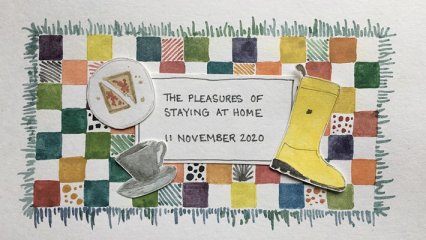
Dr Eleanor Ratcliffe from the School of Psychology looked at the positive environmental psychological experiences of being at home during the coronavirus lockdown.
2020 was the year to #stayathome, with COVID-19 restricting movement outside the home for significant portions of the year. Now, in autumn, the UK weather is increasingly cold, wet and dark. It's the perfect time to make the most of being indoors!
This online event was a mix of short presentations from academics at the University of Surrey, followed by interactive activities/discussion. Attendees received resources outlining evidence-based ways in which wellbeing can be maximised at home.
Topics and speakers:
- Sustainable homes of the future (Dr. Chris Jones)
- Happiness through favourite places in the home (Dr. Eleanor Ratcliffe)
- How to successfully work from home (Dr. Birgitta Gatersleben)
- Privacy and personalisation in your home (Ms. Sadhana Jagannath)
- The benefits of indoor gardening (Dr. Emma White).
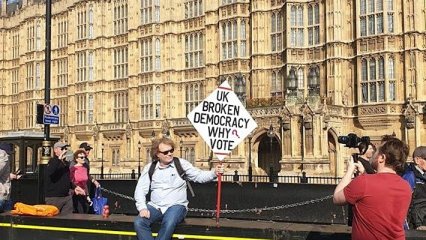
Professor Simon Usherwood from the Department of Politics and Professor Holger Breinlich from School of Economics and other colleagues tried to ‘make sense of Brexit.'
With the looming end of the transition period, Brexit remains at the forefront of our public and political debate. But a lot of what you hear is from partisans on different sides, more interested in selling their position than setting out what the plain facts of the matter might be. To help redress that, we offered the opportunity to pick the brains of some of the leading academic experts on this topic, during a night of question-and-answer from the heart of Guildford. With expertise in economic, political and legal aspects of the UK’s withdrawal from the European Union, we offered a response to all those burning questions that you’ve never felt you’ve gotten a straight answer to. And yes, sometimes that answer was going to be that we don’t yet know. So, no pitching for your vote, no being evasive, no hand-waving: just straight-down-the-line answers, to help you get a handle on all of it.
The panel included:
Professor Simon Usherwood: Working in the Department of Politics, Simon’s research has focused on the negotiations between the UK and EU, the practicalities of Brexit and the wider role of euroscepticism in the UK. He has been Deputy Director of the ESRC-funded “UK in a Changing Europe” programme, dedicated to sharing academic insights into the public debate.
Prof. Holger Breinlich: Holger is based in the Department of Economics, and has produced several key studies into the impact of Brexit on living standards, trade and general economic performance.
Dr Simona Guerra: Dr Simona Guerra works in the Department of Politics on various aspects of public opinion, EU politics and how people have experienced Brexit. She is also a member of the Centre for Britain and Europe.
#SurreyBrexitRoundtable
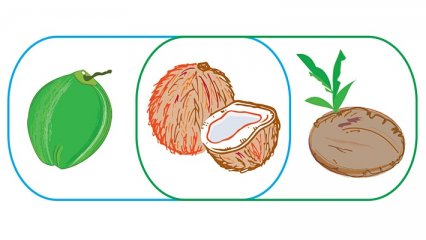
Michael Franjieh from the Surrey Morphology Group led a session about endangered indigenous languages and how they shape human thought and cognition.
We discuss several endangered indigenous languages in the Pacific Island countries of Vanuatu and New Caledonia. Each language has a set of classifiers, linguistic markers that categorise a person’s possessions into different groups based on how they intend to use them. For example, speakers have to say ‘I will drink my drinkable coconut’ or ‘eat my edible coconut’, where the italiscised words represent the classifiers. A speaker can use different classifiers depending on how they intend to use their coconut. Different languages in the South Pacific have different numbers of classifiers ranging from two to well over twenty.
Our online event revolved around the discussion of specially commissioned pictures of key local objects from the South Pacific by Isabelle Ritzenthaler, an artist based in New Caledonia who has illustrated many indigenous language story books. Isabelle, along with speakers of the languages of New Caledonia and Vanuatu discussed the cultural importance of what the images depict and how they would categorise them in their indigenous languages. Our team of academics discussed their recent research into how these linguistic markers affect thought and cognition.
We invited our online participants to have a go themselves with our online task to see how they would categorise the pictures and if their answers matched what speakers from the South Pacific did in our research study.
Finally, we wrapped up our event by inviting our attendees to a Q&A session.
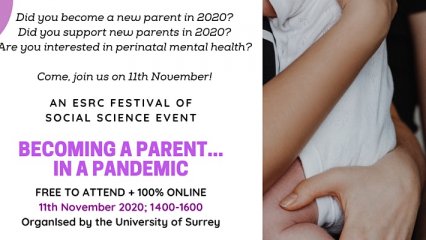
Dr Ranjana Das and Dr Paul Hodkinson from the Department of Sociology shared research on the impact of the coronavirus on new parents. Health visiting professionals and members of the public who themselves became new parents in 2020 were guest speakers.
Becoming a parent in a pandemic brought together new mothers and fathers with those who study, support and campaign for them, to shine a spotlight on the challenges and support-needs of those going through pregnancy, birth and post-natal life amid COVID19 and social distancing requirements.
Part of the ESRC Festival of Social Science, this online event was for new mothers and fathers (or those about to be), perinatal health practitioners, charities, campaigners and others with an interest in maternal and paternal wellbeing amidst COVID19.
Session on new motherhood amidst COVID-19 speakers:
- Farah Lunat: Lancashire Care NHS Trust and ROSHNI2
- Rosey Adams: PND and ME
- Ranjana Das: University of Surrey (A new mum of 2020)
- Kate Mattocks: University of East Anglia (A new mum of 2020).
Session on new fatherhood amidst COVID-19 speakers:
- Andy Mayers: Bournemouth University + Dorset MIND
- Kathy Jones: The Fatherhood Institute
- Paul Hodkinson: University of Surrey
- Simon Farewell: A new dad of 2020.
Discussion:
- Rachael Parker/Melita Walker: Institute of Health Visiting
- Elizabeth Duff: National Childbirth Trust
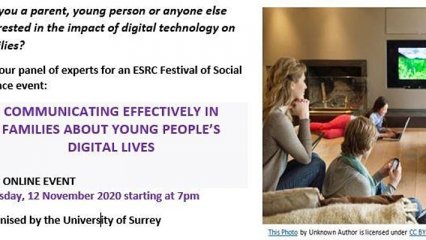
Dr Emily Setty from the Department of Sociology discussed how digital technology affects young people and her webinar explored the challenges of communication within families, in particular young peoples’ digital lives.
We welcomed parents and young people as well as anyone interested in how exposure to and involvement with the digital world affects young people and their families. Speakers drew on their knowledge and experience of working with young people, parents and schools to discuss the opportunities and challenges of the digital era for families and how families may want to understand and address the issues that young people face.
Speakers:
- Charlotte Robertson, Digital Awareness UK
- Leah Jewett, Outspoken Sex Ed
- Cynthia Crossley, Habyts
- Emily Setty, University of Surrey.
Discussant: Paul Hodkinson, University of Surrey.
Lockdown measures meant that families saw unprecedented impacts on the nature of young people’s use of and relationship with digital media, as well as on the norms, behaviours and forms of self-regulation that changed and developed throughout the Covid-19 pandemic.
Drawing on up-to-date academic evidence and the insights of the experts, the webinar looked at current and topical digital trends. It also explored best practice in terms of effective communication at home about young people’s digital lives and the challenges and barriers that both parents and young people can experience in speaking openly and honestly about the risks and issues (as well as the rewards and opportunities) of digital media.
The speakers shared their perspectives based on their work and the research evidence before responding to questions from the audience.
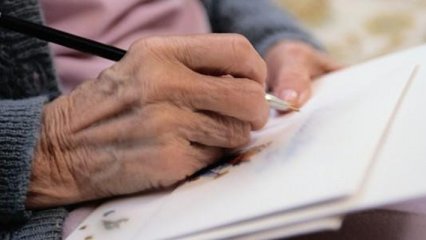
Richard Green from the School of Health Sciences invited people aged 65 or over who live alone to complete lockdown story postcards. Responses were presented in this virtual event and uncovered the needs of this community during these unprecedented times.
Researchers were keen to understand older peoples’ experiences during the Covid-19 lockdown, so they could inform future social science research and identify the needs of different communities in an ever-changing and unpredictable landscape.
This event reported on an activity inviting older people to submit postcards where they reflected on their experiences during the Covid-19 national lockdown that began in March 2020. It was a space to discuss and reflect on the impact of this significant event on older people's lives, and how older people's experiences are informing research interests and activities in the School of Health Sciences at the University of Surrey.
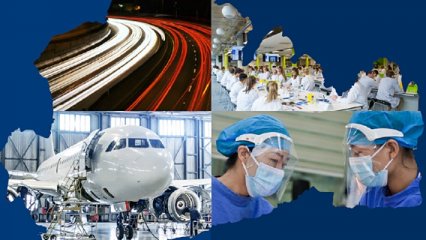
Professor Amelia Hadfield who heads up the Centre for Britain and Europe showcased work that her team have been doing to demonstrate the crucial link between academia, policy makers and industry ahead of launching her hotly anticipated report.
Commissioned by the Future Economy Surrey Commission, this comprehensive report incorporated detailed analysis and strategic recommendations gathered from key business, healthcare, aviation and knowledge economy stakeholders from across Surrey between June-October 2020.
Chaired by former Chancellor of the Exchequer, Philip Hammond, the Future Economy Surrey Commission has drawn upon the extensive data and analysis within the report in its various recommendations to ensure Surrey's overall recovery.
This launch event brought together the report's authors, representatives from Surrey County Council and the Commission, a number of the local and national decision-makers who contributed to the report, as well as key stakeholders from the four 'clusters' explored including business, healthcare, aviation and knowledge economy voices.
In addition to providing vital insights on Surrey's ability to respond to Covid, the event itself supported the broader goal of demonstrating how universities can engage more fruitfully with local government, local stakeholders and local communities alike.
In this respect this event aimed to demonstrate just how crucial the link between academia, policy makers and industry leaders really is and how shared analysis, outreach, networking and knowledge exchange are just some of the aspects of University life that shape contemporary research and innovation.
With contributions from leading Principal Investigators at the University of Surrey and their collaborators and commissioners at Surrey County Council, this event offered insights into how and why university research needs to work even more closely with local partners in government, business, community and society.
Speakers:
- Professor Max Lu - Vice Chancellor, University of Surrey
- Philip Hammond - Chair, Future Economy Surrey Commission
- Tim Oliver ( Leader) and other representatives from Surrey County Council.
Stay connected
Latest tweets
@ESRCimpact



